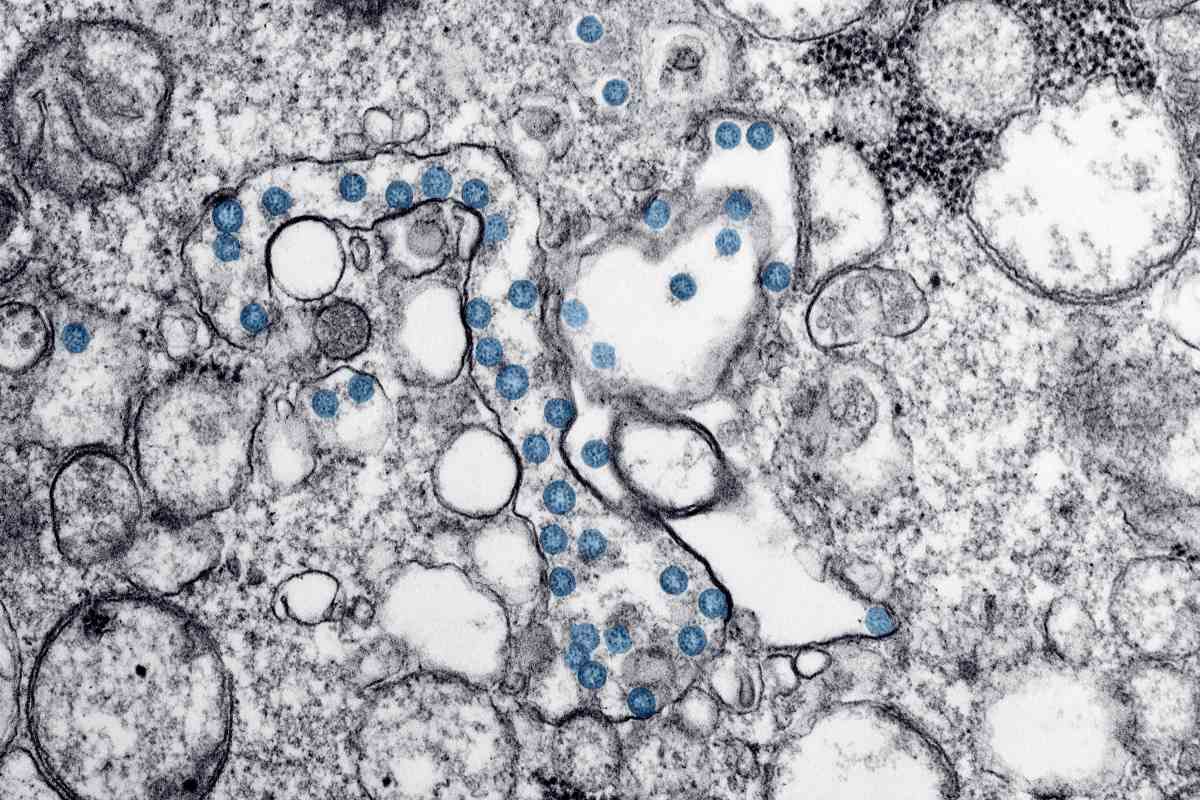
Transmission electron microscopic image of an isolate from the first U.S. case of COVID-19, formerly known as 2019-nCoV. The spherical viral particles, colorized blue, contain cross-section through the viral genome, seen as black dots. Image credit: CDC/ Hannah A Bullock; Azaibi Tamin
For the last few months, the COVID-19 pandemic has affected almost every aspect of our lives—from how we manage our physical health, to the search for a vaccine, and to an increased need for mental health support. Four new research projects are now underway at the University of Alberta to build a multi-pronged, precision health approach to address these issues.
Funded by the Canadian Institute for Advanced Research (CIFAR) as part of the AI and COVID-19 Catalyst Grants initiative, the projects focus on a broad range of topics, including drug-discovery, identifying and protecting at-risk groups, expedited diagnostics, mental health, and virtual data collection. They include partners from across Canada in both the private and public sectors.
CIFAR’s AI and COVID-19 Catalyst Grants Program is funded by the Genome Canada, the Government of Ontario, the Max Bell Foundation, Microsoft AI, and the Natural Sciences and Engineering Research Council of Canada (NSERC), and many individual donors.
Learn more below about these newly funded projects leading the charge in the battle against COVID-19. Looking for more? Find out how other University of Alberta-led research is supporting global efforts against the COVID-19 pandemic on the University of Alberta COVID-19 research hub.
Facilitating drug discovery
Matthew Taylor, associate professor in the Department of Computing Science, is working with Quebec-based partners Mila and 99andBeyond to bring the power of machine learning into the battle against COVID-19.
A fellow of the Alberta Machine Intelligence Institute (Amii), Taylor is working closely with fellow machine learning experts to accelerate the discovery of safe and effective treatments for COVID-19. The team is looking for small molecules that have already been tested and approved as pharmaceuticals that may be effective in managing COVID-19 as well. Using already-approved molecules that are proven safe will accelerate the path to implementation.
Importantly, the outcomes of Taylor’s work will be made open access, providing important and promising data to the wider research community.
Alberta Machine Intelligence Institute
Drawing from world-leading academic research at the University of Alberta and other institutions, Amii helps Alberta workers reskill and upskill for high-demand careers in artificial intelligence and guides Alberta-based businesses as they implement artificial intelligence across operations and build their in-house capabilities and teams.
Looking after our most vulnerable
Identifying and protecting at-risk groups is the focus of another newly funded project, called Guarding At-Risk Demographics with AI (GuARD-AI).
The project is designed to use AI to identify vulnerable groups, predict the course of disease at both the individual and health system levels, and use this insight to inform future virtual health-care delivery models. Importantly, GuARD-AI is designed to support Alberta and Canada now during the COVID-19 pandemic, as well as to prepare us for future public health challenges.
GuARD-AI’s interdisciplinary focus involves collaborators from across campus, including: Daniel Baumgart, professor in the Faculty of Medicine & Dentistry’s Department of Medicine and director of the Division of Gastroenterology; Randy Goebel, professor in the Department of Computing Science and Amii fellow; Geoffrey Rockwell, professor in the Faculty of Arts’ Department of Philosophy; and Martha White, assistant professor in the Department of Computing Science, CIFAR AI Chair, and Amii fellow.
Managing the most severe symptoms
Severe illness and death due to COVID-19 is most often a result of pneumonia. In order to flag this problem as early as possible, a team of UAlberta researchers are partnering with private company MEDO.ai—an AI-augmented 3D ultrasound platform—to develop a diagnostic tool that uses machine learning to identify pneumonia in ultrasound scans.
The ultimate goal is to detect pneumonia as early as possible, getting patients supportive care earlier in hopes of preventing more severe outcomes.
The project is being led by Russ Greiner, professor in theDepartment of Computing Science and Amii fellow, as well as two faculty members in the Faculty of Medicine & Dentistry’s Department of Radiology and Diagnostic Imaging, Associate Professor Kumaradevan Punithakumar and Assistant Professor Jacob Jaremko. Jaremko is co-founder of MEDO.ai, a UAlberta spinoff company.
Tracking mental health
While the novel coronavirus attacks our physical health, our mental health and wellbeing are also affected during the global pandemic.
Alona Fyshe is combining the power of machine learning and the ubiquitous use of social media in order to understand the challenges the pandemic presents, and how these challenges are threatening our mental health en masse. Social media provides valuable insight into the experiences of people around the world—and especially for marginalized groups, including those with limited access to health care, lower socioeconomic status, and undocumented immigrants.
Fyshe, an assistant professor in theDepartment of Computing Science and theDepartment of Psychology, CIFAR AI Chair, and Amii fellow, is partnering with scientists at New York University and Western University on this project.